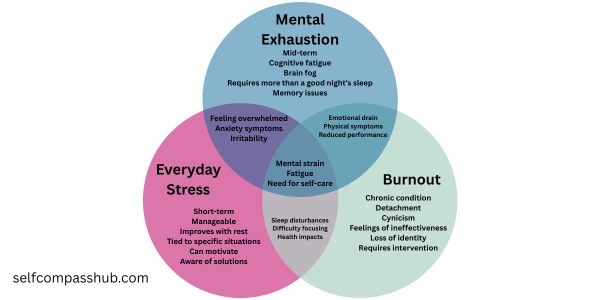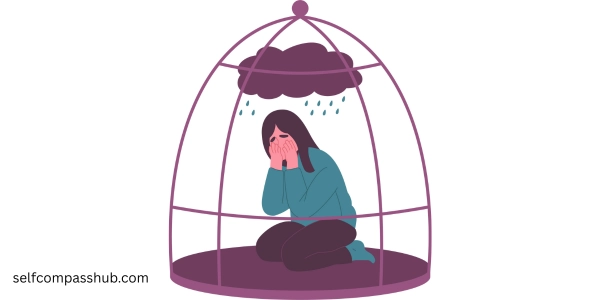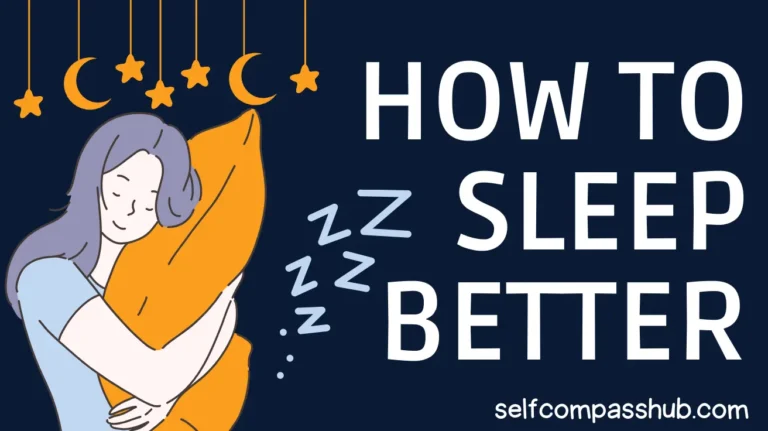“Self-care is not self-indulgence, it is self-preservation.” – Audre Lorde
We all face challenges in our daily lives that test our mental resilience. When these challenges become overwhelming and persistent, they can lead to mental exhaustion and burnout. Recognizing the signs early and taking proactive steps to address them is crucial for maintaining your overall wellbeing.
What is Mental Exhaustion and Burnout?
Mental exhaustion occurs when your brain has been overworked for an extended period, leading to cognitive fatigue and diminished mental performance.
Burnout is a state of chronic stress that leads to physical and emotional exhaustion, cynicism, detachment, and feelings of ineffectiveness and lack of accomplishment.
Common Signs of Mental Exhaustion and Burnout
🧠 Physical Signs
- Persistent fatigue that isn’t relieved by rest
- Sleep disturbances (insomnia or oversleeping)
- Frequent headaches or muscle tension
- Weakened immune system and frequent illness
- Changes in appetite or weight
- Digestive issues
💔 Emotional Signs
- Feelings of failure and self-doubt
- Decreased satisfaction and sense of accomplishment
- Detachment and feeling alone in the world
- Loss of motivation
- Increasingly cynical and negative outlook
- Decreased sense of joy or pleasure in activities
🔍 Cognitive Signs
- Difficulty concentrating or focusing
- Forgetfulness and memory problems
- Decreased productivity and performance
- Inability to make decisions
- Brain fog and mental confusion
- Difficulty learning new information
👤 Behavioral Signs
- Withdrawing from responsibilities
- Isolating from others
- Procrastinating or taking longer to get things done
- Using food, drugs, or alcohol to cope
- Taking frustrations out on others
- Skipping work or coming in late/leaving early
How to Overcome Mental Exhaustion and Burnout
1. Recognize and Acknowledge the Problem
The first step to recovery is acknowledging that you’re experiencing burnout. Be honest with yourself about your mental state and recognize that seeking help is a sign of strength, not weakness.
2. Set Boundaries
- Learn to say “no” to additional responsibilities when you’re already at capacity
- Establish clear work-life boundaries
- Limit exposure to stressors when possible
- Communicate your limits clearly to others
3. Practice Self-Care
- Prioritize sleep hygiene and aim for 7-9 hours of quality sleep
- Maintain a balanced diet rich in brain-supporting nutrients
- Engage in regular physical activity
- Spend time in nature when possible
- Practice mindfulness and meditation
- Schedule regular breaks throughout your day
4. Connect with Others
- Share your feelings with trusted friends or family members
- Join support groups with others experiencing similar challenges
- Consider professional help from a therapist or counselor
- Rebuild positive relationships that may have been neglected
5. Reassess Priorities and Values
- Identify what truly matters to you
- Align your daily activities with your core values
- Let go of perfectionism and unrealistic expectations
- Practice gratitude for what’s going well
6. Make Structural Changes
- Consider changes to your work environment or role
- Delegate tasks when possible
- Break large projects into smaller, manageable steps
- Create a more sustainable daily routine
- Use time management techniques like the Pomodoro method
7. Develop Resilience
- Build emotional awareness and regulation skills
- Practice positive self-talk and compassion
- Learn from setbacks rather than dwelling on them
- Develop a growth mindset
- Find meaning in challenges
When to Seek Professional Help
⚠️ Important: If your symptoms of burnout are severe or persistent despite self-help strategies, consider seeking help from:
- 👨⚕️ A primary care physician
- 👩💼 A mental health professional
- 🏢 Employee assistance programs
- 👥 Support groups
Remember that recovery from burnout is not instantaneous. It’s a journey that requires patience, self-compassion, and consistent effort. By recognizing the signs early and implementing these strategies, you can overcome burnout and build greater resilience for the future.
Final Thoughts
Mental exhaustion and burnout aren’t signs of weakness or failure – they’re indicators that something in your life needs attention and change.
By listening to these signals and taking proactive steps to address them, you can not only recover but emerge stronger and with greater self-awareness than before.
Your mental health matters. Prioritize it not as a luxury, but as an essential foundation for everything else in your life.
If you found this article helpful, feel free to share it with others who might benefit.








